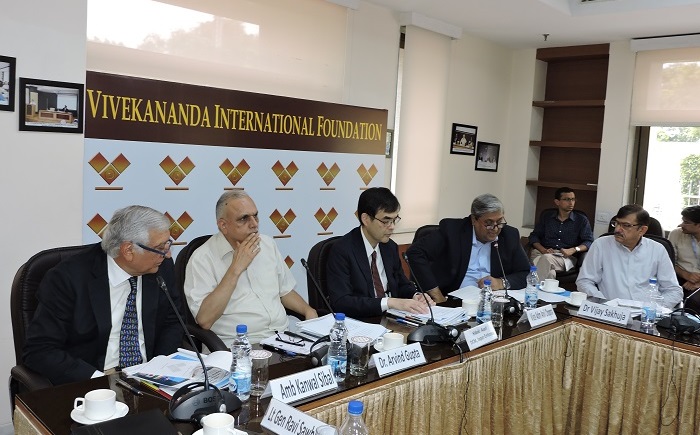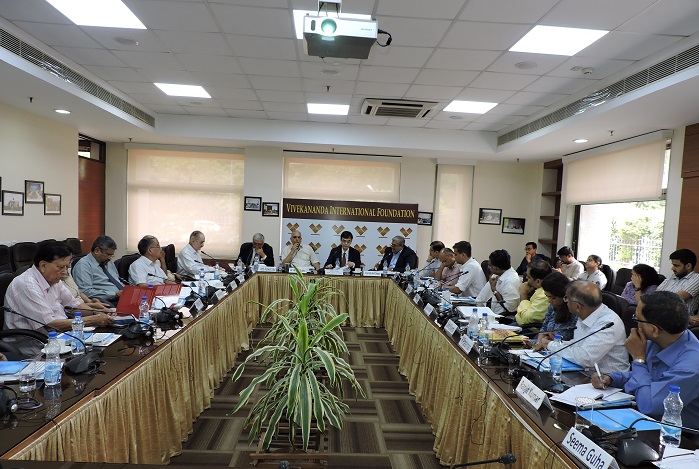

Recognising that stability and security in the Indian Ocean Region (IOR) is extremely important for peace, prosperity and sustainable development of the international society, the Sasakawa Peace Foundation (SPF) Japan, SPF USA, National Security College (NSC) Australia and Vivekananda International Foundation (VIF) India had together formed the Quadripartite Commission on the Indian Ocean Security. Consequently, international conferences were convened in February 2017 and 2018 at New Delhi and Tokyo respectively. This was preceded by a seminar in Washington DC in April 2016. The participants from the four nations have reflected independent Track 2.0 viewpoints.
The policy recommendations emerged at the conclusion of the of the Commission’s research are being released by all the four institutions. VIF released the recommendations on August 22, 2018 at New Delhi. The program was chaired by the Director VIF, Dr. Arvind Gupta and attended by Amb Kanwal Sibal, Mr Hideki Asari, Deputy Chief of Mission, Embassy of Japan in India, Mr Nobuo Tanaka, Chairman SPF Tokyo (through video conference), Vice Adm Anil Chopra (member NASB), Dr. Vijay Sakhuja, the representatives of the media and other scholars. The recommendations cover a wide spectrum of issues that impinge upon the security of the Indian Ocean. The leitmotif of the discussions during the release are summarised below.

Indian Ocean has been a theatre of peaceful economic activities for many centuries. However, with the emergence of powerful international players and non-state actors the region is confronted with a multitude of security concerns. At present, the Indian Ocean is showing no signs of imminent and large scale inter-state conflict. But, changes in the global balance of power with the entry of China in the IOR has raised uncertainty and friction, affecting the overall strategic environment. In this respect the Commission made policy recommendations on diplomacy, economy, environment, humanitarian issues, defence and security.
Diplomatically Australia, India, Japan and the US recognise the fundamental importance of an Indo-Pacific defined by a rule-based order and the principles of freedom and openness. The Indo-Pacific has enormous infrastructure needs for economic development and investment on infrastructure are welcome, so long as it is on the basis of reasonable debt financing practices, respect of sovereignty and territorial integrity. The proposed economic corridors through Pakistan and Myanmar and port projects in Sri Lanka and Maldives pose risks to these principles.
The growing economic activities in the Indian Ocean are accompanied by overfishing and destruction of the environment, which create risks for the sustainable development of the region. Cyclones and high tides often cause damage to civic life and infrastructure in the IOR, necessitating Humanitarian Aid & Disaster Relief (HADR). But in many cases, multinational forces dispatched on rescue missions cannot always work effectively as there are no agreed SOPs to guide their functioning.

Security threats from non-state actors include piracy, smuggling, and Unreported and Unregulated Fishing (IUUF). Dealing with these threats need shared picture on the location and identity of vessels in the Indian Ocean or the Maritime Domain Awareness (MDA). In this regard, one possibility is to expand the role and functions of the Regional Cooperation Agreement on Combating Piracy and armed robbery (ReCAAP). China has been assertive and unilateral on its maritime claims in the South China Sea. China’s ambitious naval expansion and bases will give it the capability to increase its maritime forces in the Indian Ocean substantially. For this part, the four nations would have to increase their force deployments and cooperation with a range of other partners to balance the destabilising impact of larger Chinese presence.
Amb Amb Kanwal Sibal was in support of annual planning conferences on issues such as shipping, submarines and anti-surface warfare. He also backed the views of Mr. Nobuo Tanaka that Japan should induct nuclear propulsion in its naval inventory. Mr. Hideki Asari, affirmed that Japans vision for free and open Indo-Pacific is inclusive and is founded on rule based order. Mr. Nobuo Tanaka too endorsed his views on free and open Indo-Pacific. Vice Adm Anil Chopra felt that the QUAD partnership has indeed succeeded in restoring order and improving stability, besides reassuring other smaller nations in the Indo-Pacific. Dr. Vijay Sakhuja recommended that there is a necessity to disaggregate the issues of the region and build legal, infrastructure and physical capacities for a secure Indian Ocean.
The panelist also fielded a wide array of questions from the media. The Director finally thanked all the participants for an excellent discussion and for the insight on the extremely relevant topic.
Links:
[1] https://www.vifindia.org/event/report/2018/august/29/release-of-the-policy-recommendations-by-quadripartite-commission-on-the-indian-ocean-regional
[2] https://www.vifindia.org/sites/default/files/Policy-Recommendations.pdf
[3] https://www.vifindia.org/sites/default/files/Appendix-to-Policy.pdf
[4] http://www.facebook.com/sharer.php?title=Release of the ‘Policy Recommendations by Quadripartite Commission on the Indian Ocean Regional Security’&desc=&images=https://www.vifindia.org/sites/default/files/DSCN3936.JPG&u=https://www.vifindia.org/event/report/2018/august/29/release-of-the-policy-recommendations-by-quadripartite-commission-on-the-indian-ocean-regional
[5] http://twitter.com/share?text=Release of the ‘Policy Recommendations by Quadripartite Commission on the Indian Ocean Regional Security’&url=https://www.vifindia.org/event/report/2018/august/29/release-of-the-policy-recommendations-by-quadripartite-commission-on-the-indian-ocean-regional&via=Azure Power
[6] whatsapp://send?text=https://www.vifindia.org/event/report/2018/august/29/release-of-the-policy-recommendations-by-quadripartite-commission-on-the-indian-ocean-regional